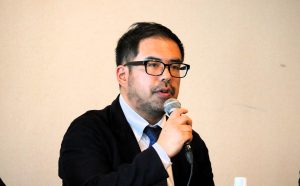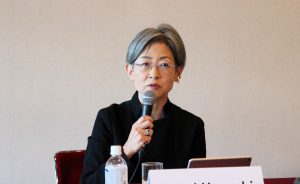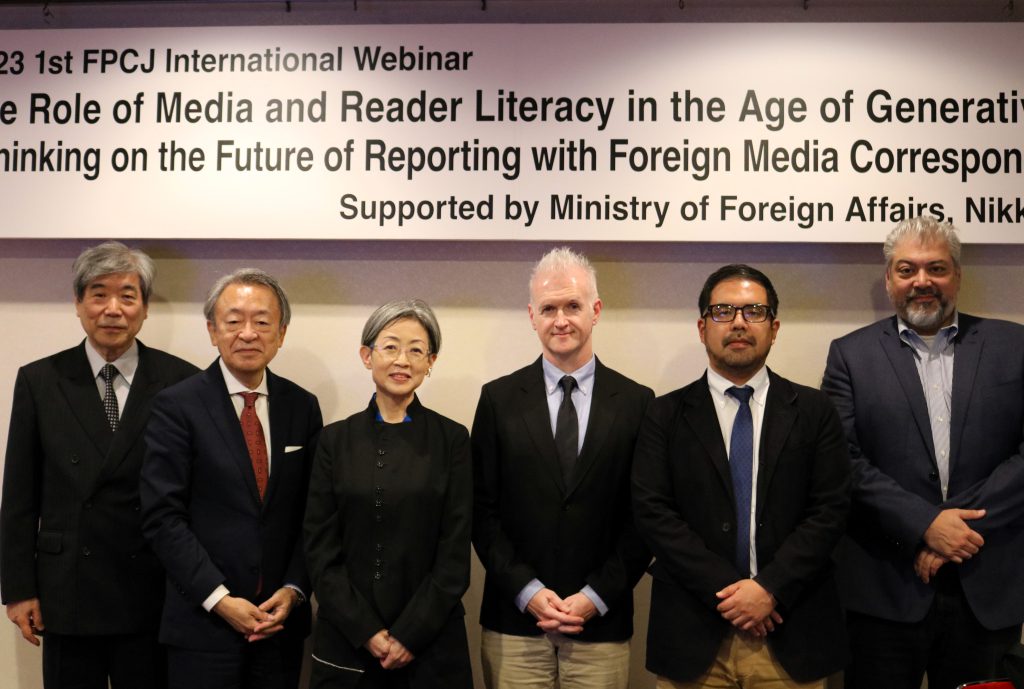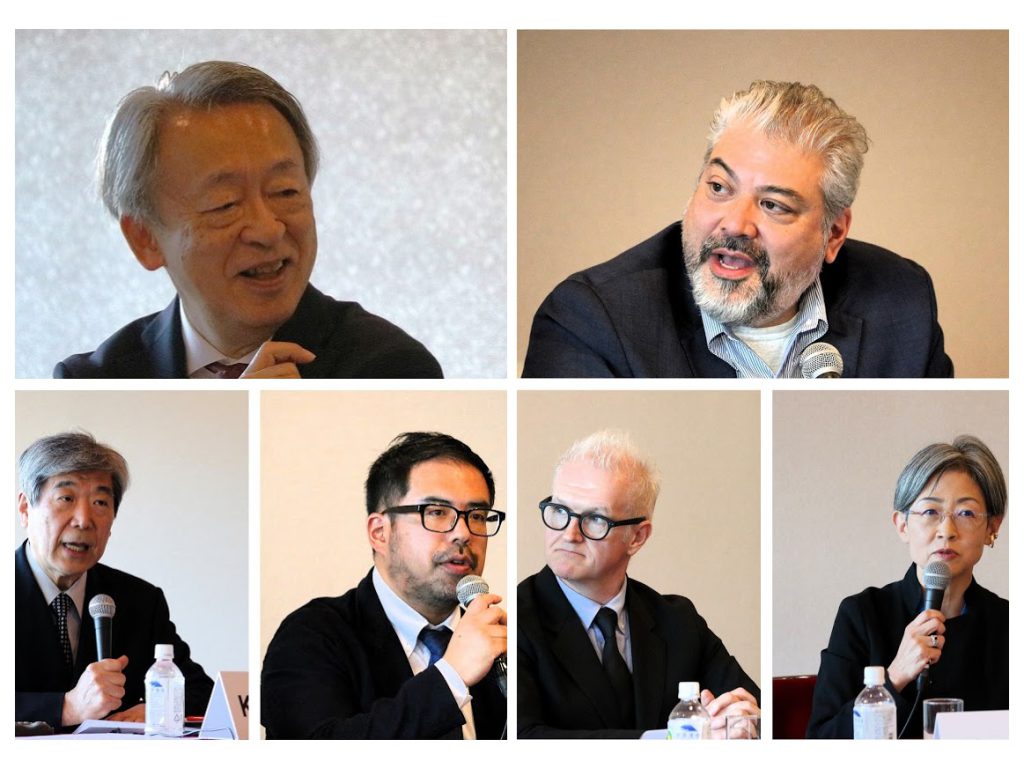[Report] FY2023 1st International FPCJ Webinar
The Role of Media and Reader Literacy in the Age of Generative AI
—Thinking on the Future of Reporting with Foreign Media Correspondents
(October 30, 2023, Supported by Ministry of Foreign Affairs, Nikkei Inc.)

1. Webinar Goals and Participants
Since Open AI released ChatGPT in November 2022, the use of generative AI that can create a variety of content has rapidly spread worldwide. With Japan facing a severe labor shortage due to its declining birthrate and aging population, increased efficiency and productivity are critical issues in various industries, and AI and robotics have already become indispensable.
Mr. Akira Ikegami, an FPCJ councillor, was the moderator for this webinar, and panelists included Japanese correspondents from Western media as well as a member of the Japanese media and an expert on the topic. They discussed how, with innovations in AI, journalists’ jobs will change, what roles journalists will be expected to play, and what readers and viewers should keep in mind when encountering news content.
A total of 230 people registered to watch the webinar, and 130 joined it live.
2. Program/Links to the Chapters of the Video Clip Above
|
Opening remarks |
|
|
Session 1 (initial statements, discussion, summary) |
|
|
Session 2 (discussion, summary) |
|
|
Q&A |
|
|
Overall summary |
|
|
Closing remarks |
3. Introduction of Panelists
*For details on the webinar and its panelists, see here.
[Moderator]
Akira Ikegami, Professor, Meijo University; Institute Professor, Tokyo Institute of Technology;
Freelance Journalist; FPCJ Councillor
[Panelists]
Foreign Media:
Tim Kelly, Senior Correspondent, Reuters Tokyo Office
Reed Stevenson, Senior Editor, Bloomberg Tokyo Office
Japanese Media:
Akira Oikawa, AI Quantum Editor, The Nikkei
Expert:
Kaori Hayashi, Executive Vice President, The University of Tokyo; Professor, Graduate School of
Interdisciplinary Information Studies, The University of Tokyo
[MC]
Kazuo Kodama, FPCJ President
4. Session Summaries
 Four main points were determined to be important: (1) Having accepted that the use of generative AI is inevitable, determining what value a human journalist can add to an article that cannot be reproduced by an AI, (2) Media clearly indicating to readers whether or not generative AI was used in the creation of content (transparency), (3) Considering the significant latent risk of information (particularly videos) produced by generative AI being spread as misinformation, ensuring developers (and businesses) responsibly disclose information to the public, so civil society can use generative AI safely (in order to protect democracy), and (4) Readers acquiring critical thinking skills so as to avoid being manipulated due to taking information produced by generative AI at face value.
Four main points were determined to be important: (1) Having accepted that the use of generative AI is inevitable, determining what value a human journalist can add to an article that cannot be reproduced by an AI, (2) Media clearly indicating to readers whether or not generative AI was used in the creation of content (transparency), (3) Considering the significant latent risk of information (particularly videos) produced by generative AI being spread as misinformation, ensuring developers (and businesses) responsibly disclose information to the public, so civil society can use generative AI safely (in order to protect democracy), and (4) Readers acquiring critical thinking skills so as to avoid being manipulated due to taking information produced by generative AI at face value.
Session 1: Use of AI by Media and Points of Concern
 Oikawa noted that the company he works at (Nikkei) was already using a generative AI similar to ChatGPT for research and to come up with ideas, but due to a lack of accuracy the articles produced by the AI were not released as is, and tentative efforts were also underway to use AI for data analysis. Regarding the use of generative AI, he noted that while newspapers should be cautious when it comes to using AI in order to maintain the quality of their articles, they should still use it in order to benefit from the technological advancements which have been made. He explained that due to the serious labor shortage in Japan, using AI to improve productivity through automization was important in the news industry as well. However, only humans can go to the site of an accident, speak with people, and turn that into an article. He suggested that the value of journalists may lie in being able to go to where a conflict is ongoing, speak to people on both sides of the conflict, and then communicate that from a human perspective (that of the journalist themselves).
Oikawa noted that the company he works at (Nikkei) was already using a generative AI similar to ChatGPT for research and to come up with ideas, but due to a lack of accuracy the articles produced by the AI were not released as is, and tentative efforts were also underway to use AI for data analysis. Regarding the use of generative AI, he noted that while newspapers should be cautious when it comes to using AI in order to maintain the quality of their articles, they should still use it in order to benefit from the technological advancements which have been made. He explained that due to the serious labor shortage in Japan, using AI to improve productivity through automization was important in the news industry as well. However, only humans can go to the site of an accident, speak with people, and turn that into an article. He suggested that the value of journalists may lie in being able to go to where a conflict is ongoing, speak to people on both sides of the conflict, and then communicate that from a human perspective (that of the journalist themselves).
 Kelly commented that Reuters had a history of incorporating new technology ever since its founding, and currently, sometimes when generative AI was used to translate a simple English article into Japanese, no human would check the translation. If an AI is used in writing an article, it is always clearly indicated, so there is transparency for the readers. He suggested that the use of AI is both a challenge and an opportunity, with AI being very useful for transcribing speech, but currently there are aspects of investigative journalism that only humans can do, such as seeing how small events connect into something bigger, and confirming reliability. Humans take care in doing work, which AI cannot.
Kelly commented that Reuters had a history of incorporating new technology ever since its founding, and currently, sometimes when generative AI was used to translate a simple English article into Japanese, no human would check the translation. If an AI is used in writing an article, it is always clearly indicated, so there is transparency for the readers. He suggested that the use of AI is both a challenge and an opportunity, with AI being very useful for transcribing speech, but currently there are aspects of investigative journalism that only humans can do, such as seeing how small events connect into something bigger, and confirming reliability. Humans take care in doing work, which AI cannot.
 Stevenson started by explaining that Bloomberg has been using generative AI for years to summarize press releases and create headings. While noting concerns about low quality based on the fact that generative AIs are systems that rely on probability, he also noted that they were powerful tools for transcription and summarizing text, and that in the future more advanced AI might be able to be used as a tool to check the authenticity of news, and whether fake news was created by another AI or not. He suggested that a major role for journalists was to use interviews to draw out information in people’s minds that has not been digitized yet, connect the dots between information gained during their reporting, and report on information that was not widely known yet. He also commented on the quick cycle of personnel shuffling in the Japanese media, and although he was not sure it was related, that the brief span in which journalists worked in a specific position meant they could only acquire a limited amount of information, and that could be a factor in the lack of quality and quantity of international news available in Japanese. He proposed actively using AI to solve this issue, by translating news from international media organizations into Japanese.
Stevenson started by explaining that Bloomberg has been using generative AI for years to summarize press releases and create headings. While noting concerns about low quality based on the fact that generative AIs are systems that rely on probability, he also noted that they were powerful tools for transcription and summarizing text, and that in the future more advanced AI might be able to be used as a tool to check the authenticity of news, and whether fake news was created by another AI or not. He suggested that a major role for journalists was to use interviews to draw out information in people’s minds that has not been digitized yet, connect the dots between information gained during their reporting, and report on information that was not widely known yet. He also commented on the quick cycle of personnel shuffling in the Japanese media, and although he was not sure it was related, that the brief span in which journalists worked in a specific position meant they could only acquire a limited amount of information, and that could be a factor in the lack of quality and quantity of international news available in Japanese. He proposed actively using AI to solve this issue, by translating news from international media organizations into Japanese.
 Hayashi stated that since generative AI could handle a variety of tasks, it was necessary to consider what exactly professionalism was for a journalist. Also, if various government, business, and educational organizations began relying on technology such as ChatGPT, developed by a private company, that company would become powerful in its own right, and so it was necessary to train journalists knowledgeable about generative AI technology. She also mentioned that she wanted to see reporting that reflected voices heard while researching the story, with a clear human element. She noted that in order for professional journalists in Japan to do the work expected of them in the age of generative AI, it might be necessary to make fundamental structural changes to the Japanese media, such as how people transfer to other departments every few years, how proofreading is done, and developing global networks.
Hayashi stated that since generative AI could handle a variety of tasks, it was necessary to consider what exactly professionalism was for a journalist. Also, if various government, business, and educational organizations began relying on technology such as ChatGPT, developed by a private company, that company would become powerful in its own right, and so it was necessary to train journalists knowledgeable about generative AI technology. She also mentioned that she wanted to see reporting that reflected voices heard while researching the story, with a clear human element. She noted that in order for professional journalists in Japan to do the work expected of them in the age of generative AI, it might be necessary to make fundamental structural changes to the Japanese media, such as how people transfer to other departments every few years, how proofreading is done, and developing global networks.
Session 2: How Will AI Change the Media—Future Media and Reporting
Oikawa stated that since the arrival of the internet, the opinion that “news should be available for free,” which is beneficial to consumers, became widespread, but for the news organizations that are confirming facts and ensuring the proper wording is used, it is difficult for them to maintain their reporting activities when they are not being appropriately compensated. He added that ensuring quality news reporting was necessary for a healthy democracy, and that there was also the risk of fake audio and photographic information in the age of generative AI, therefore it was necessary to acquire literacy regarding technological advancements made in order to utilize them.
Kelly noted that although humans were able to draw the line between being creatively inspired by something and plagiarizing it, AI had difficulty doing so. He suggested that in order for news organizations to be trusted by their readers or viewers, they should explain the standards and rules their company’s reporting is based on, but in return he hoped for those readers not to so easily believe the news they read on social media without a clear source, and to trust legitimate news organizations. He mentioned that with anyone now able to disseminate information via social media, preventing fake news is difficult, but he would like people to rely on trusted sources.
Stevenson predicted that other systems like ChatGPT would continue to be made in the future, based on the information available in a specific medium. He also suggested that although it was important to clearly indicate the reliability and limits of information when creating an article with generative AI, readers and viewers should also shoulder some responsibility themselves. He proposed that skillsets for how to properly search for information and how to determine its legitimacy be part of the education system, at an early stage.
Hayashi noted there was the possibility of making it more difficult to access information and prevent its public use by protecting and strengthening copyright. Also, she stated that information was a kind of power, and due to a lack of women and other minorities disseminating information, their existence was forgotten. She commented that it was necessary for people to have the critical thinking skills to realize that intents and purposes existed behind the information, as well as costs. Finally, she argued that as generative AI had an element of being a public good, it was necessary to use it appropriately while keeping in mind the wealth inequality between nations and companies, and so a platform should be built to share both the knowledge gained and its failures.
Ikegami, the moderator, concluded the session by suggesting that ChatGPT clearly indicating its sources could be a partial solution to the issue of copyright protection.

Q&A Session
Before the overall summary, questions were accepted from the audience. Questions included: (1) If an AI was provided with facts that had been checked by a human, do you think the AI could write an article of the same quality as a human journalist? (2) What is your perspective on the possibility of rapidly advancing AI being very valuable to Japan when it comes to translation and education? (3) What benefits do you think will be brought about by this rapid advance in AI?
Overall Summary
The panelists and moderator finished the webinar with the following comments:
Stevenson stated that he had hopes for new technology and tools such as generative AI, and that by using them the value of journalists would become clear, and workflows could become more efficient. He indicated his hope that with improved workflows, readers and viewers would be able to acquire, process, and understand information more efficiently and effectively.
Oikawa commented that humanity had built civilization with its advanced language skills and text, but generative AI was the first non-human existence to be able to control language to this degree, and humanity was now faced with the necessity of rethinking its roles and value. As news organizations and journalism cannot avoid this impact, their roles and reason for existence are being questioned, and each journalist has to think about their own role in this new age, and find a way to coexist with generative AI.
Kelly stated that AI was a tool, and whether it was beneficial or harmful came down to how it was used. He also noted that it was very important to decide on rules.
Hayashi noted that the trend of information and data being connected to power and money would grow even stronger going forward, and there was a concern that power and money might gain even more control over information and data. He also mentioned the possibility that new technology might even have an impact on our awareness, and she felt hope that professional journalism and education might help restore our humanity. She stated that how to maintain the current structure was the challenge being faced, and it was important to learn from the mistakes and failures (in using generative AI) and share them (with society as a whole). Our hope would be originality in the language space of the daily life of humans, and journalism being able to draw out what is inside people’s heads.
Ikegami stated there was a major difference for a Hanshin Tigers fan when comparing an article about their victory written by an AI, or one written by a journalist who was a huge fan themselves, and that articles in which human emotions and passion come across are important. The specialized knowledge and insight of professional journalists while become more important than ever, and he would like those who have chosen to become journalists to think about how they can become something irreplaceable. He concluded by stating that with Google’s algorithm and generative AI’s becoming black boxes which are difficult to comprehend, specialized journalists are necessary, and acting as a watchdog for new powers appearing due to generative AI would also become increasingly important.



